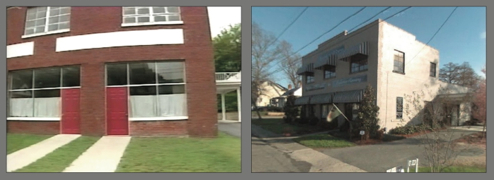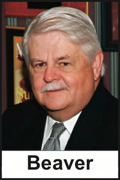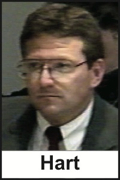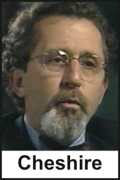Rascals case in brief
In the beginning, in 1989, more than 90 children at the Little Rascals Day Care Center in Edenton, North Carolina, accused a total of 20 adults with 429 instances of sexual abuse over a three-year period. It may have all begun with one parent’s complaint about punishment given her child.
Among the alleged perpetrators: the sheriff and mayor. But prosecutors would charge only Robin Byrum, Darlene Harris, Elizabeth “Betsy” Kelly, Robert “Bob” Kelly, Willard Scott Privott, Shelley Stone and Dawn Wilson – the Edenton 7.
Along with sodomy and beatings, allegations included a baby killed with a handgun, a child being hung upside down from a tree and being set on fire and countless other fantastic incidents involving spaceships, hot air balloons, pirate ships and trained sharks.
By the time prosecutors dropped the last charges in 1997, Little Rascals had become North Carolina’s longest and most costly criminal trial. Prosecutors kept defendants jailed in hopes at least one would turn against their supposed co-conspirators. Remarkably, none did. Another shameful record: Five defendants had to wait longer to face their accusers in court than anyone else in North Carolina history.
Between 1991 and 1997, Ofra Bikel produced three extraordinary episodes on the Little Rascals case for the PBS series “Frontline.” Although “Innocence Lost” did not deter prosecutors, it exposed their tactics and fostered nationwide skepticism and dismay.
With each passing year, the absurdity of the Little Rascals charges has become more obvious. But no admission of error has ever come from prosecutors, police, interviewers or parents. This site is devoted to the issues raised by this case.
On Facebook
Click for earlier Facebook posts archived on this site
Click to go to
Today’s random selection from the Little Rascals Day Care archives….
Click for earlier Facebook posts archived on this site
Click to go to
Today’s random selection from the Little Rascals Day Care archives….
Two historic sites, two wildly different outcomes

CBS; Google
At left, the Eden Street building shortly after Little Rascals closed; at right, the building in 2008.
June 3, 2013
In the aftermath of the McMartin Preschool case in California, the building was razed and the site probed for secret tunnels.
In the aftermath of the Little Rascals Day Care case in Edenton, the building was turned into the East of Eden Spa and Kuttin Up Salon.
Both Nancy Smith Barrow and her daughter have been customers at the spa. “It truly was a strange experience to go back in,” she says.
‘Attached to their convictions’ – and then some
 Dec. 24, 2012
Dec. 24, 2012
“Why prosecutors sometimes fight post-conviction evidence so adamantly depends on each case. Some legitimately believe the new evidence is not exonerating.
“But legal scholars looking at the issue suggest that prosecutors’ concerns about their political future and a culture that values winning over justice also come into play. ‘They are attached to their convictions,’ (says Brandon Garrett, a law professor at the University of Virginia), ‘and they don’t want to see their work called into question.’ ”
– From “The Prosecution’s Case Against DNA” in the New York Times Sunday Magazine (Nov. 25, 2011)
“Attached to their convictions,” indeed. Nancy Lamb was so attached that in 1996, after Bob Kelly’s 99-count conviction was overturned, she rummaged around the office and turned up yet another molestation claim – this one from two years before the Little Rascals arrests.
Gerald Beaver, Kelly’s attorney, pointed out that the law requires any report of sexual abuse to be investigated immediately and called police investigator Brenda Toppin, who testified that she had told Lamb about the claim in 1992. Lamb denied any recollection of Toppin’s comment.
“All of this ‘We care about the children’ kind of went down the drain after the conviction,” Beaver said. “It was only when (Kelly) successfully appealed and was no longer pulling 12 consecutive life sentences that the state felt compelled to go out and find this witness.”
As usual, however, time proved no object for prosecutors dedicated to making life miserable for Little Rascals defendants. It would be 1999 before they dropped the final charge against Bob Kelly.
Prosecutor reneged on promise to Betsy Kelly
 July 8, 2013
July 8, 2013
“As the parents made their case to the (North Carolina Parole Commission), prosecutors and defense attorneys continued sparring over whether the state had reneged on the plea bargain by trying to block (Betsy) Kelly’s parole.
“Kelly’s attorney, Joe Cheshire V, says prosecutor William Hart promised not to contest her parole if she agreed to the no-contest plea. Hart says the state never made such a pledge.
“Hart and assistant prosecutor Nancy Lamb attended the hearing to support the parents. They say it would be inappropriate for Kelly to be released, because she continues to publicly proclaim her innocence.
“ ‘The parents know she is guilty,’ Lamb told reporters before the hearing. ‘They know what their children have gone through.’
“Cheshire, continuing to maintain his client’s innocence, said Hart should have tried Kelly in court if he wanted to show she was guilty.
“ ‘He was afraid to do that,’ Cheshire said. ‘And now he’s running around saying that since she won’t admit her guilt, she should not get paroled. I think that’s pretty pathetic.’ ”
– From “Parents oppose parole for Little Rascals operator” in the News & Observer (April 12, 1994)
Pandering, bullying, grandstanding, double-crossing – in thwarting Betsy Kelly’s parole, the Little Rascals prosecutors scored a grand slam of misfeasance.
Here’s what Joe Cheshire recalls about that brutal day:
 “Simply taking that plea was distasteful to me, but when the awesome power of government meshes with the awesome power of the judiciary and neither want to find the truth, but instead to consummate a decided outcome, the individual gets ground up in the process.
“Simply taking that plea was distasteful to me, but when the awesome power of government meshes with the awesome power of the judiciary and neither want to find the truth, but instead to consummate a decided outcome, the individual gets ground up in the process.
“Betsy was desperate to come home and did not trust anyone, nor should she have. I am not a fool; I would not have agreed to such a plea if it did not insure her freedom. The only (apparent) risk was the Parole Board. The prosecutor had agreed to not oppose her parole, but then he reneged. He knew that our only alternative was to move that the plea be set aside and that we would not be in a position to do that.
“Yes, in retrospect I should not have trusted him…. But he was not willing to put it in writing, and (insisting on that) would have ended the negotiations….”
Little Rascals prosecutors seemed perversely unable to let any defendant go home without administering a final cheap shot. When Scott Privott was released under a no-contest plea deal in 1994, they added a last-minute stipulation that he undergo psychiatric evaluation as part of his five-year probation.
“I saw them weekly for about two months,” Privott recalls, “and then they reported that I was normal. My probation officer told me (Bill) Hart was pissed… and that was that.”
‘The most fundamental questions of fairness’
July 5, 2013
“RALEIGH – During a hearing at the state Court of Appeals, Chief Judge Gerald Arnold repeatedly asked a state prosecutor about the fairness of testimony by (Bob) Kelly’s former attorney in Edenton. Arnold said the attorney had, in effect, testified that he believed in Kelly’s innocence until he learned his child had been abused.
“ ‘How can you argue that it was not extremely prejudicial?’ the judge asked.
“Associate Attorney General Ellen Scouten argued that Chris Bean did not divulge confidential information and did not violate an attorney-client relationship with Kelly. She said Bean testified as a parent and a crime victim.
“Arnold said Bean, now a district court judge, had gone beyond describing what he had seen and witnessed as a parent.
“ ‘This boils down to the most fundamental questions of fairness,’ Arnold said. ‘When you have an attorney testifying that “I was Mr. Kelly’s attorney and I believed in him very strongly until I learned the truth, that is to say that he’s guilty, and then I was shattered.” How can there be more prejudicial, stronger evidence put before a jury than to have a former attorney, the defendant’s attorney say that?’
“Scouten said that because the defense had contended that accusers in Edenton were hysterical people on a witch hunt it was fair to allow the state to show the type of people involved.
“ ‘Mr. Bean and his wife were reputable, respected thoughtful, educated people – not the type of people that would be swept up by community hysteria,’ she said.”
– From “Appeal of 2 defendants in Little Rascals case draws a crowd” in the News & Observer (Jan. 10, 1995)
Given this line of questioning, it came as no great surprise when four months later the Court of Appeals overturned the convictions of both Kelly and Dawn Wilson.
Bean’s unfettered opinionating was only one of three major defects cited by the court, the others being the withholding of exculpatory evidence by prosecutors and the testimony of parents as expert witnesses.
The prosecution got off light – the brief filed by appellate defender Mark Montgomery claimed no fewer than 222 potentially reversible errors.











0 CommentsComment on Facebook